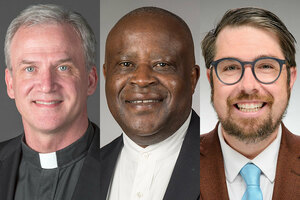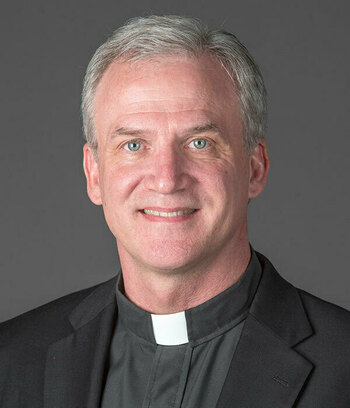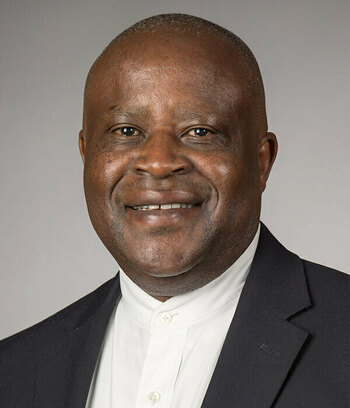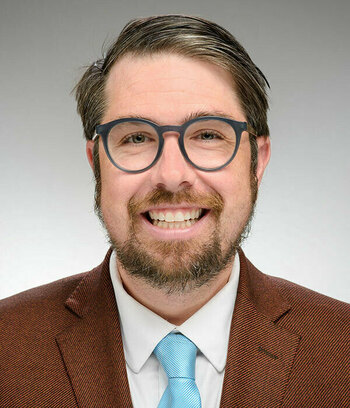
Six University of Notre Dame faculty members garnered seven book awards, including three first-place honors, from the Catholic Media Association in 2023.
Fr. Dan Groody, C.S.C., professor of theology and global affairs and vice president and associate provost for undergraduate education, took top honors in the Theology–History of Theology, Church Fathers and Mothers category for his book, A Theology of Migration: The Bodies of Refugees and the Body of Christ.
Fr. Emmanuel Katongole, professor of theology and peace studies, earned first place in the Gender Issues–Inclusion in the Church category for Who Are My People?: Love, Violence, and Christianity in Sub-Saharan Africa.
And Timothy P. O’Malley, professor of the practice and director of education at the McGrath Institute for Church Life and academic director of the Notre Dame Center for Liturgy, won in the Future Church category for Becoming Eucharistic People.

Father Groody’s A Theology of Migration, which has a foreword written by Pope Francis, draws upon first-hand accounts of narratives of those migrating around the world and reflects upon them under the light of the God, who first migrated to our world in the person of Jesus Christ.
“In a world where so many migrants are considered ‘no-bodies,’ it reminds of their desire to become somebody, their connection to everybody, and ultimately their relationship to the body of Christ,” he said. “This award is about highlighting their journey of hope and its integral relationship to our own.”
Judges called the book a timely and immensely important contribution to the field of contemporary theological studies.
“Groody views the current global crisis of the migration of peoples through the lens of the Eucharistic action of the Church. He develops a spirituality of migration that is at the heart of every believer’s journey of faith,” they wrote.
“His connection between the ‘bodies of refugees’ and the ‘Body of Christ,’ understood as both the person of Christ and the persons of all the faithful, is imaginative, theologically solid and, if put into practice, transformative for every believer and for the Church itself.”

Father Katongole said he is humbled and delighted that the CMA chose Who Are My People?, which examines what it means to be an African and a Christian in a continent often riddled with violence, for a first-place award.
“It is a great honor to me personally, but a confirmation that the gender and identity issues that the book discusses are important issues not only in Africa but for the global church. I look forward to the conversation that will be generated by this recognition.”
A judge described Who Are My People? — which traces the crisis of recurring violence through three markers of identity: ethnicity, religion, and land — as an important, well-written, and readable exploration of issues of identity, violence, and peace in Africa.
“The conclusions Katongole draws also have broader implications,” the judge wrote. “I especially thought the stories of individuals and programs were well done, and I appreciated the photos…I hope Catholics and others read it to learn more about these urgent issues facing Africa and our world.”

O’Malley said the CMA’s recognition for Becoming Eucharistic People is meaningful because it's written from the heart of the mission of the Notre Dame Center for Liturgy.
The book outlines four essential dimensions of a Eucharistic culture in a parish: liturgies of joyful reverence that celebrate the gifts of diversity; formation that engages the mind, imagination, understanding, and will; a rich life of popular piety and the vibrancy of the domestic Church; and a commitment to solidarity with neighbors.
“We think that the rites of the Church are not just quaint exercises in piety,” said O’Malley, “but opportunities for the renewal of an imagination that perceives the gratuity of the world sending forth Catholics from parishes who can sanctify the cosmos and create a culture marked by friendship, reverence for the dignity of the person, the common good, solidarity, and justice.”
Judges wrote that O’Malley “offers a deep appreciation of what the Eucharist means personally and communally and how it truly is the ‘source and summit’ for the Christian life in the world.”
O'Malley also earned a second-place award in the Sacraments category for Invitations and Encounter: Evangelizing Through the Sacraments, which presents a pastoral introduction to sacramental theology from the standpoint of evangelization.
J. Matthew Ashley, associate professor of theology, took second place in the Theology–Theological and Philosophical Studies category for Renewing Theology: Ignatian Spirituality and Karl Rahner, Ignacio Ellacuría, and Pope Francis.
In this comprehensive study that investigates the role that Ignatian spirituality has played in the renewal of academic theology, Ashley offers three case studies to show how each Jesuit ― Rahner, Ellacuría, and Pope Francis ― responded to challenges of modernity on the basis of his experience and understanding of Ignatian spirituality..
Clemens Sedmak, director of the Nanovic Institute for European Studies and professor of social ethics, garnered second place in the Catholic Social Teaching section for Enacting Catholic Social Tradition: The Deep Practice of Human Dignity.
In the book, Sedmak emphasizes that Catholic social tradition stems from moral guidance directly inspired by Scripture, especially the command to love Christ and the neighbor, even if doing so is extremely difficult in real-life situations.
Leonard DeLorenzo, professor of the practice and director of undergraduate studies at the McGrath Institute for Church Life, earned third place in the Grief and Bereavement division for Our Faithful Departed.
In Our Faithful Departed, DeLorenzo discusses what “life is changed not ended” in the funeral liturgy means and how Catholics are called to remain faithful in their relationships with the dead.
The Catholic Media Association, which has been uniting and serving Catholic journalists since 1911, facilitates the professional development and spiritual growth of its members.
Originally published by at al.nd.edu on July 18, 2023.